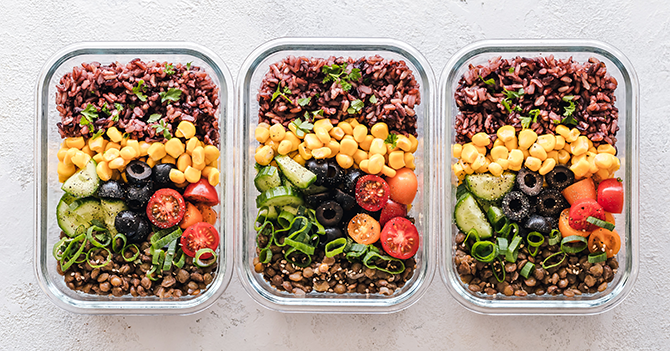Everything About Healthy And Balanced Food: Benefits of Taking On Plant Based Options
The discussion bordering plant-based diet regimens has gotten significant focus in the last few years. Lots of individuals are discovering the possible health benefits, dietary benefits, and environmental influences associated with these dietary choices. As people end up being more conscious of their food's influence on well-being and sustainability, concerns develop regarding the functionalities of adopting such a lifestyle. What certain adjustments can one expect, and just how might these options reshape not only individual wellness however likewise the earth's future?
Recognizing Plant-Based Diets
Many people connect plant-based diets primarily with vegetarianism or veganism, these diet plans can include a wide array of consuming patterns that focus on whole, minimally processed plant foods. Such diet regimens usually include fruits, vegetables, whole grains, seeds, nuts, and legumes, while removing or limiting pet items. This adaptability allows people to tailor their dietary choices according to dietary needs and individual preferences. Some may adopt a mainly plant-based diet regimen while still periodically consuming meat or dairy, typically referred to as a flexitarian method. The focus continues to be on incorporating more plant foods, which can bring about a diverse range of meals and flavors. Understanding these numerous analyses of plant-based eating is vital for valuing its ease of access and allure in contemporary food culture.
Health Advantages of Plant-Based Foods
The health advantages of plant-based foods are considerable, using a nutrient density benefit that sustains overall well-being. Research study shows that these foods can improve heart health and wellness and play a crucial duty in effective weight management. By including a lot more plant-based alternatives, individuals might improve their dietary options and advertise long-lasting health.
Nutrient Thickness Benefit
Nutrient thickness plays a crucial duty in the health advantages of plant-based foods, making them an engaging option for those seeking a balanced diet. Plant-based foods, such as fruits, veggies, legumes, nuts, and entire grains, are often rich in necessary vitamins, minerals, and anti-oxidants while being lower in calories. This high nutrient density enables people to take in fewer calories while still meeting their nutritional needs. In addition, these foods are loaded with dietary fiber, promoting gastrointestinal health and aiding in weight monitoring. By including nutrient-dense plant-based choices, consumers can enhance their total health, sustain their body immune systems, and minimize the risk of persistent conditions. Ultimately, the nutrient density of plant-based foods highlights their importance in a health-conscious way of life.
Heart Health Renovation

Weight Administration Assistance
Along with advertising heart health and wellness, a plant-based diet regimen can substantially help in weight monitoring. This dietary technique highlights entire foods such as fruits, vegetables, beans, nuts, and whole grains, which are usually reduced in calories and higher in fiber compared to animal-based items. The high fiber material assists increase satiation, reducing general calorie intake. Additionally, plant-based diet regimens are typically rich in necessary nutrients while reduced in unhealthy fats, making it much easier to maintain a healthy weight. Plant Based Beef. Research study suggests that individuals that adopt a plant-based way of life have a tendency to have reduced body mass indexes (BMIs) and experience even more successful weight management compared to those that take in meat-heavy diets. Accepting plant-based alternatives is a critical selection for effective weight management.
Nutritional Value of Plant-Based Components
Plant-based components are abundant in essential nutrients, providing a diverse array of vitamins, minerals, and antioxidants that add to general wellness. A contrast of protein sources exposes that while animal products are frequently considered as remarkable, several plant-based alternatives give ample protein and other useful compounds. Comprehending the dietary worth of these active ingredients can aid people make notified nutritional choices.
Essential Nutrients in Plants
Nutrient-rich ingredients found in plants supply a varied variety of necessary nutrients that contribute greatly to overall health. These active ingredients are abundant in vitamins A, C, and K, which support immune feature, vision, and blood clotting, respectively. In enhancement, plants supply crucial minerals such as potassium, magnesium, and calcium, crucial for heart health, muscle feature, and bone strength. The visibility of fiber in plant-based foods help digestion and advertises a healthy and balanced digestive tract microbiome. Anti-oxidants, discovered abundantly in vegetables and fruits, assistance combat oxidative stress and anxiety and decrease swelling. Moreover, many plant foods are reduced in calories yet high in nutrients, making them an outstanding option for those looking for to maintain a healthy weight while ensuring suitable nutrient intake.
Contrasting Protein Resources
Protein resources differ substantially in their dietary profiles, with plant-based components offering distinct advantages. Unlike pet proteins, which commonly contain saturated fats and cholesterol, plant healthy proteins have a tendency to be reduced in these harmful parts. Legumes, nuts, seeds, and whole grains are abundant in essential amino acids, her response fiber, vitamins, and minerals. For example, lentils supply high protein material along with substantial iron and folate, while quinoa is a total protein, providing all nine important amino acids. Furthermore, plant-based proteins are usually accompanied by anti-oxidants and phytochemicals that support overall health and wellness. The shift to plant-based protein resources not only boosts nutritional consumption but also lines up with lasting dietary techniques, reducing ecological impact and advertising long-term wellness advantages.
Environmental Influence of Plant-Based Eating
As understanding of environment adjustment grows, several individuals are discovering sustainable dietary options that can significantly decrease their environmental footprint. Plant-based consuming has actually become a considerable factor to reducing greenhouse gas emissions, which are mostly see page connected with livestock manufacturing. The farming of fruits, vegetables, grains, and veggies normally needs fewer resources, such as water and land, contrasted to pet farming. Furthermore, plant-based diet regimens can lead to reduced deforestation, as much less land is required for grazing livestock or growing animal feed. By moving towards plant-based options, customers can sustain biodiversity and advertise much healthier ecosystems. On the whole, embracing plant-based eating not only benefits personal wellness but also represents an important step towards ecological sustainability and conservation efforts.
Overcoming Common Misconceptions
While numerous individuals acknowledge the benefits of a plant-based diet plan, a number of false impressions commonly deter them from totally welcoming this way of living. An usual belief is that plant-based diet plans lack sufficient protein; however, countless plant sources, such as vegetables, nuts, and tofu, offer ample healthy protein. In addition, some presume that this diet is expensive, when in reality, staples like beans, rice, and seasonal veggies can be rather budget-friendly. One more mistaken belief is that plant-based eating is excessively restrictive, whereas it in fact uses a diverse selection of foods and flavors. Ultimately, lots of fret that a plant-based diet might result in deficiencies, yet with correct planning, individuals can get all required nutrients, including nutrients, while appreciating a broad variety of scrumptious dishes.
Tips for Transitioning to a Plant-Based Way of living
Making the shift to a plant-based way of living can be an improving experience, though it commonly requires some support to navigate the preliminary modifications. First, individuals are motivated to begin progressively, integrating even more fruits, vegetables, vegetables, and entire grains right into their meals while lowering meat and dairy products intake. Meal preparation is important; preparing an once a week food selection can aid ease the change and stop final undesirable selections. Exploring new dishes and cooking approaches can also improve the experience and preserve exhilaration regarding plant-based eating. Furthermore, joining support system or areas can give inspiration and share valuable ideas. Remaining educated concerning nourishment assurances balanced meals, avoiding deficiencies while fostering a healthy and balanced, enjoyable plant-based way of living.

Delicious Plant-Based Dish Concepts
Exploring tasty plant-based dish ideas can influence people to embrace a much more nourishing diet. One popular alternative is a passionate quinoa salad, featuring cherry tomatoes, cucumber, and a spicy lemon-tahini clothing. An additional favorite is a mouthwatering lentil stew, loaded with carrots, celery, and fragrant herbs, ideal for a comforting dinner. For breakfast, over night oats made with almond milk, chia seeds, and covered with fresh berries supply a nourishing start to the day. Additionally, a lively veggie stir-fry with tofu and a selection of vibrant veggies can be a quick yet satisfying dish. Velvety avocado salute on whole-grain bread, sprayed with seasonings and seeds, uses a basic yet savory treat. These dishes display the range and splendor of plant-based consuming.

Regularly Asked Inquiries
Can a Plant-Based Diet Provide Sufficient Protein?
The question of whether a plant-based diet regimen can offer enough healthy protein is common. Numerous resources, including beans, nuts, seeds, and whole grains, can meet healthy protein needs properly, supporting a well balanced and healthy diet regimen for people.
Are Plant-Based Diets Ideal for Children?
The viability of plant-based diets for youngsters depends on cautious planning. Appropriate nutrients must be assured, including proteins, minerals, and vitamins. With appropriate assistance, such diet plans can sustain healthy development and growth in children.
Just how Do I Eat in restaurants on a Plant-Based Diet plan?
Eating out on a plant-based diet plan includes seeking restaurants with varied menus, requesting alterations, and exploring vegan-friendly alternatives. Planning in advance and communicating dietary choices can enhance the dining experience while keeping nutritional choices.
What Prevail Irritants in Plant-Based Foods?
Usual allergens in plant-based foods include soy, gluten, nuts, and seeds - Plant Based Chicken. People adhering to a plant-based diet ought to know these allergens and check out labels thoroughly to stay clear of adverse reactions and ensure risk-free intake
Can Plant-Based Diets Aid With Weight-loss?
Research study shows that taking on a plant-based diet regimen might help with weight reduction due to its typically reduced calorie density and higher fiber web content. This combination can enhance satiation, helping individuals handle their calorie consumption effectively. Several people associate plant-based diets mainly with vegetarianism or veganism, these investigate this site diet regimens can incorporate a vast array of consuming patterns that focus on whole, minimally processed plant foods. Nutrient density plays a vital function in the health and wellness benefits of plant-based foods, making them an engaging selection for those seeking a balanced diet. Plant-based diets have actually been revealed to noticeably boost heart health and wellness, as they commonly include elements that sustain cardio function. In enhancement to promoting heart health, a plant-based diet regimen can considerably aid in weight monitoring. A typical belief is that plant-based diets do not have adequate protein; nonetheless, many plant resources, such as beans, nuts, and tofu, give adequate protein.